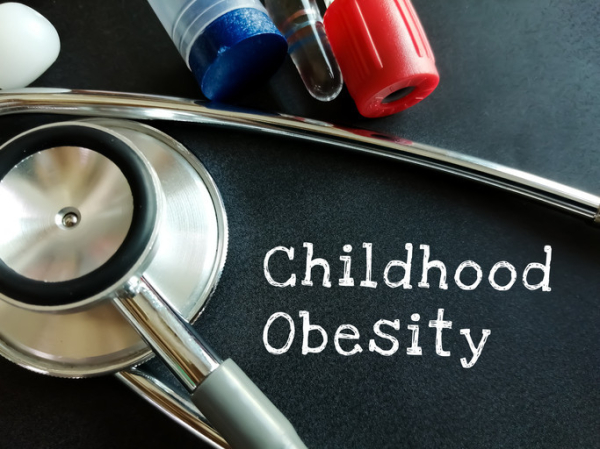
Obesity is a complex health issue that affects a staggering percentage of US children and teens. Hovering around 5% in 1963 to 1965, rates of obesity had more than tripled to 19% by 2017 to 2019. Early data suggest childhood obesity rates continued climbing during the pandemic. If these trends continue, 57% of children currently ages 2 to 19 will have obesity as adults in 2050.
In a nutshell, this puts more than half of children now alive in the US at greater risk for high blood pressure, heart disease, diabetes, liver disease, and the other health complications of obesity. Stress, depression, and poor self-esteem are often linked to stigma surrounding obesity. For these reasons and more, the American Academy of Pediatrics recently updated clinical practice guidelines for evaluating and treating children and teens with obesity.
A complex interplay contributes to childhood obesity
Obesity has long been stigmatized as simply a problem of personal choice: if people just ate less and exercised more, they would not be obese, experts once believed. But the medical evidence is far more complicated than that. Genetic, physiologic, socioeconomic, and environmental factors contribute to obesity in children.
- Calories and foods. It is true that excess calories and eating unhealthy foods play a significant role in the development of obesity. But many families don’t have easy access to healthy foods like fresh foods and vegetables. For many children, the only foods available to them are heavily processed foods, fast foods, and other unhealthy foods, which may be all their families can afford or find — and not all schools offer healthy foods either. Even when families do have resources, they are often stressed in ways that make putting time and energy into healthy eating hard.
- Exercise. While it is also true that regular exercise helps keep children at a healthy weight, many children live in places where there aren’t safe places to play outside, and their parents either cannot afford to sign them up for activities or do not have the time to bring them to those activities — or both.
- Other factors influencing obesity. Prenatal factors, such as maternal weight gain or gestational diabetes, increase risk before a child is even born. We are just beginning to understand genetic factors, many of which can be further affected by the child’s environment. There are ways that systemic racism and deeply embedded socioeconomic factors play a role. Simply put, obesity is complicated.
Work with your child’s doctor on a plan for better health
The new guidelines recommend that your doctor should:
- Screen regularly for obesity, using body mass index (BMI) as a measure. This calculation uses a child’s height and weight and is given as a percentage based on age (unlike in adults, where the number alone is used). It’s not a perfect measure, but it is the best we have. A BMI higher than the 95th percentile for age is considered obese.
- Look at the whole picture when a child is gaining too much weight for their age or is at an unhealthy weight. Where does your family live? What is your socioeconomic status? What can you share about beliefs, daily life, school, ethnic background, and community connections? Willingness and ability to make lifestyle changes? All of this, along with family medical history, matters when it comes to understanding and helping develop a good plan.
- Explain options for treatment. The best evidence-based treatment is called intensive health behavior lifestyle treatment, or IHBLT. This involves face-to-face, family-based, multidisciplinary counseling on nutrition and physical activity, preferably based in your community and connected to community resources. To make a difference, it should involve at least 26 hours over at least three to 12 months. These programs, unfortunately, are not easily available to most families.
What if the comprehensive program called IHBLT is not available?
When a comprehensive program is not available, the new guidelines recommend that pediatricians:
- Try to see children with obesity regularly, do their best to understand and manage all the contributing circumstances, and encourage strategies endorsed by professional organizations, including:
- drinking fewer sugar-sweetened beverages
- using recommendations and recipes at myplate.gov
- getting kids engaged in 60 minutes a day of moderate to vigorous physical activity
- finding ways to avoid inactivity (sedentary behavior) generally, such as limiting screen time and encouraging active games.
- Consider medications. A number of weight-loss medicines have been approved for children. Benefits are modest for all of them and don’t take the place of lifestyle changes.
- Consider surgery. Bariatric surgery may offer the greatest long-term benefits, especially for children or teens who have severe obesity (a BMI in the 120th percentile for age). We tend to think of this more as an option for adults, but growing evidence suggests surgery can and should be considered earlier.
What can families do together?
The Centers for Disease Control and Prevention suggests four actions families can take:
- Try to model healthy eating patterns.
- Find ways to help children move more, such as through athletics, dancing, games, and active chores.
- Help children and teens get sufficient sleep.
- Consider ways to replace screen time.
About the Author

Claire McCarthy, MD, Senior Faculty Editor, Harvard Health Publishing
Claire McCarthy, MD, is a primary care pediatrician at Boston Children’s Hospital, and an assistant professor of pediatrics at Harvard Medical School. In addition to being a senior faculty editor for Harvard Health Publishing, Dr. McCarthy … See Full Bio View all posts by Claire McCarthy, MD